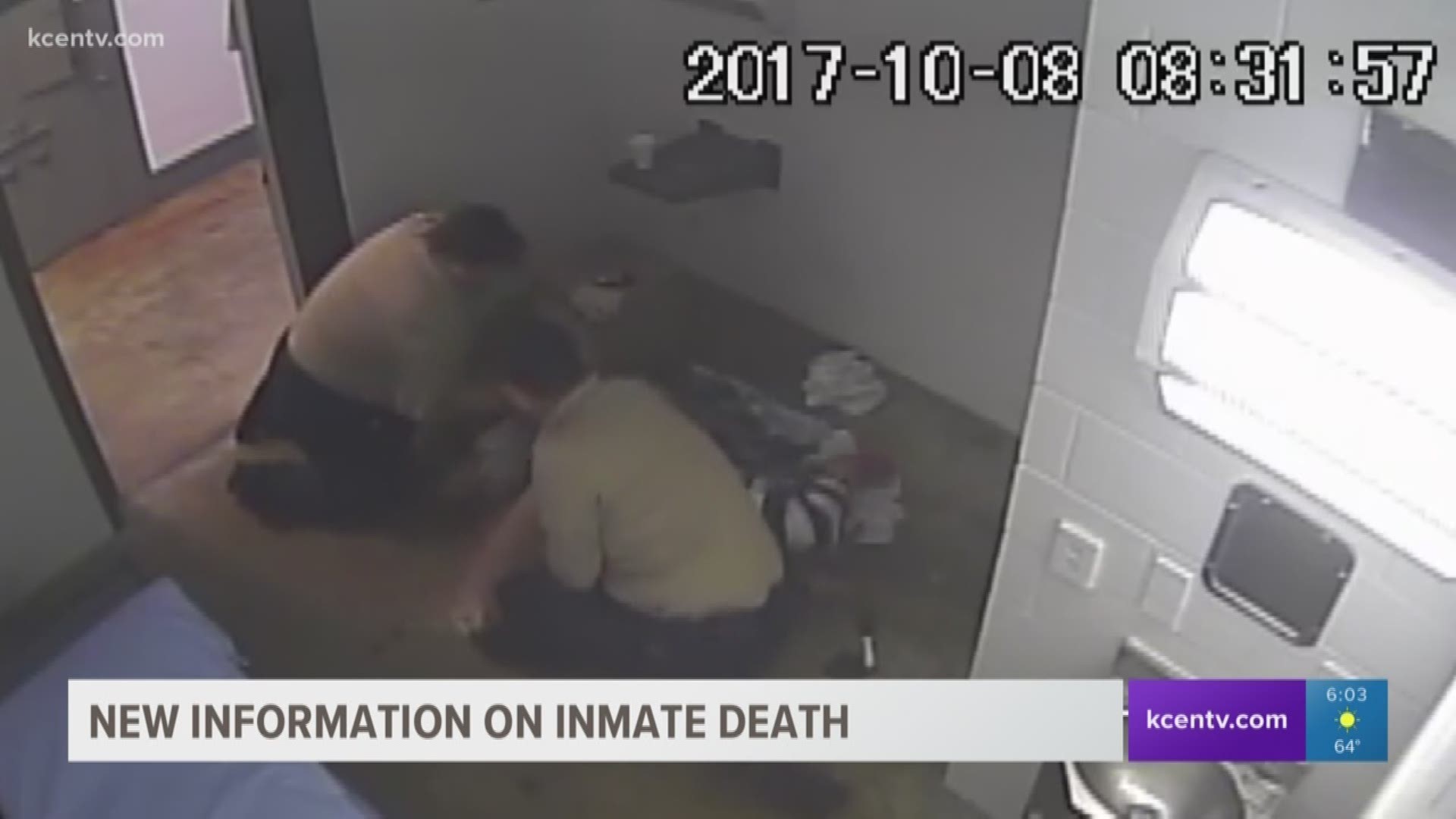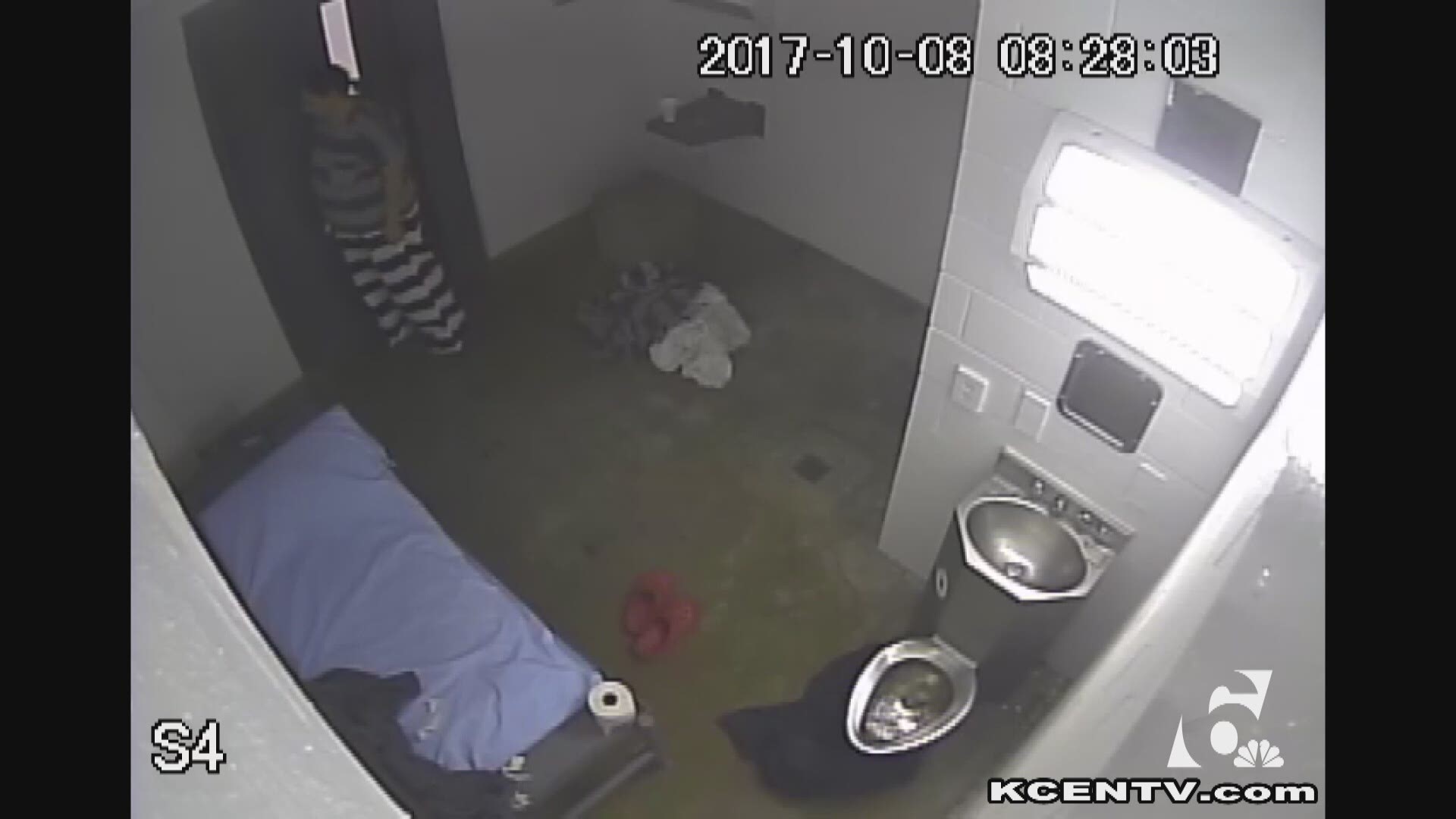GATESVILLE, Texas — An inquest hearing regarding the death of a Coryell County jail inmate who was taken to the ground and restrained by two jailers resulted in the judge ruling no criminal charges should be filed, according to a copy of the ruling.
KCEN Channel 6 obtained the Oct. 8, 2017 video from inside the jail that shows the confrontation between the jailers and Kelli Page that would end with Page's death.
RELATED: EXCLUSIVE: Graphic video shows confrontation leading to woman’s death in Coryell County Jail
Page's family filed a lawsuit on Jan. 30 against Coryell County and the two jailers, Steven Lovelady and Wesley Pelfrey, citing an autopsy report from the Southwest Institute of Forensic Sciences in Dallas said that Page died of mechanical asphyxia in association with physical restraint.
The medical examiner also concluded the manner of death was homicide, according to the autopsy report.
In the inquest hearing conducted by Coryell County District Attorney Dusty Boyd on Dec. 19, 2017, an independent medical examiner and the Texas Ranger who investigated her death disputed the findings of the autopsy report.
Dr. Sparks Veasey testified that he believed Page died because of the condition of her heart.
"There is nothing in the autopsy report that is objective that I can point to and say this was asphyxia," Veasey said during the hearing. "She has a heart that is probably about twice as big as it should be, twice as heavy, 610 grams."
Veasey, who is also a criminal attorney, said he would describe the death as a noncriminal homicide. He explained the difference between the terms homicide and noncriminal homicide.
"I would have written that the cause of death, the top line, cause, the reason that the person died, hypertensive cardiovascular disease in association with physical restraint while in custody," he said.
Judge Coy Latham would ultimately agree with Veasey in the ruling he issued on Jan. 9, 2018.
"The use of force by the jailers to gain compliance of Kelli Anne Page was necessary and appropriate," Latham wrote in the ruling.
The family's lawsuit points out that 10 competent medical examiners signed the autopsy report conducted at SWIFS.
"These physicians signed the autopsy only after reviewing evidence sufficient to provide each with the professional medical opinion that the autopsy findings were accurate based on a reasonable degree of medical probability," the lawsuit said.
The autopsy report did list hypertensive cardiovascular disease as the second cause of death.
Veasey said the autopsy report showed Page didn't have any hemorrhage in her head.
"So, no, they had nothing to do with her death," he said. "There were no skull fractures, no contusions of the brain that were described."
Veasey also said the jailer was performing CPR correctly and her broken ribs were a result of the CPR.
The county's other witness in the inquest hearing was Texas Ranger Adam Russell, who investigated the case.
He said the jailers' statements were consistent with the video, according to court documents.
"I believe their statements are directly -- they portrayed the video," he said. "I should say their statement was corroborated by the video."
Russell subpoenaed Page's medical records as part of the investigation, but he hadn't received them at the time of the initial autopsy, he said in court.
"It seemed like that was, there were several, 40 different items of health issues," he said. "And the biggest ones were high blood pressure, the history of it, and then the other heart issues that were noted on those medical records."
Russell also said in court that he's been to many autopsies and Page's heart was noticeably bigger than others he'd seen.
"The first thing I thought to myself was, 'Man, that thing is huge,'" he said.
When Boyd asked if the use of force issue was more important than her health in his investigation, Russell said, "Yes."
According to Russell, Page had been isolated from the rest of the jail population, so the jailers could more closely monitor her medication intake.
Russell said page had been "cheeking" her medicine, or hiding it to stockpile it.
"A lot of her medication were vasodilators, which act like an amphetamine," he said. "She would get high in jail."
Based on the toxicology report from the autopsy, Page was taking the prescribed amount of her medication once she was segregated from the other inmates, court documents said.
In the video of the incident, it appears Page was tapping on the window to catch a guard's attention. Russell said Page had been tapping on the window with what seemed to be a hairbrush starting around 7 a.m. on the day of the incident.
Eventually, after she banged on the door, guards had a 10-minute conversation with her, warning that they would put her in a restraint chair so she couldn't bang on the windows, according to what Russell said the jailers told him.
Russell said he also took a witness statement from one of the inmates.
"This inmate came forward and said she was wanting her commissary privileges back and that's what she was asking for," Russell said. "And she kept tapping and banging on the window and it was really unnerving is how he described it."
Russell pointed out that three jailers and one nurse have to account for the needs of all the inmates, so addressing Page's issue disrupted their workflow.
"They've got to get breakfast to all these other people," he said. "It goes against the order and security and discipline of the whole dynamic inside the jail."
Russell said he was surprised at how many chances the guards gave Page and the statement from the inmate indicated they were basically begging her to quit.
Page shook her head "no" in response to what one of the jailers said to her at the window of her cell, Russell said.
"Whatever they asked her, which according to the voluntary witness statement they gave, is they asked her to go to the back of the jail, to turn around and put her hands behind her back," he said. "At that point, she shook her head 'no.'"
This is when the video shows Lovelady pepper spray Page in the video.
"I believe Lovelady reacted appropriately because she had something in her hand," Russell said. "Instead of approaching her right away and trying to put handcuffs on her, he tried to get her to drop the brush."
Russell then described how the jailer took Page to the ground.
"He's trying to grab her other hand and then also control the hairbrush at the same time," he said. "Kelli does let go of the hairbrush, but reaches behind her back and then takes the handcuffs that were on the jailer's belt around his groin area, takes the handcuffs away. You can clearly see it on the video."
Russell said Page kept the handcuffs under her stomach.
"They are trying to turn her over, and she's spreading her feet to where they can't turn her over," he said. "She's fighting them. She's actively fighting them at that point. So, he applies two knee strikes."
The video also shows Lovelady punch Page in the face. Russell called that an appropriate response to the handcuffs being taken away and seeing the brush in her hand.
According to Russell, Page also kicked Lovelady in the groin and bit his right hand after they wrestled on the ground for a bit.
"I know there's a part where she grabs Corporal Lovelady by the groin," he said. "Lovelady responds again by striking her in the face at that point."
Boyd then asked Russell if any of the strikes went overboard in trying to get Page to cooperate.
"No, sir," Russell replied, court documents said.
The video of the incident doesn't have audio, but both jailers told Russell in their written statements that Page was screaming and cursing while they tried to handcuff her.
"I was actually really surprised at the detail of their statements and how concise it was when I watched the video," Russell said. "I think it was a very detailed summary of a very traumatic and dynamic event."
Russell said according to the doctor, when Page's body went limp in the video, it was due to an issue with her heart, since the amount of time they struggled with her wasn't long enough for strangling to happen.
"To strangle someone or to be asphyxiated, I have worked a hanging death, it takes three to four minutes before the body is medically dead," he said. "We have 72 seconds."
Although the Texas Jail Commission doesn't require jailers to be certified in CPR, Russell said Lovelady told him in a sworn statement he was CPR certified.
Boyd then asked Russell if the jailers' use of force, conduct of and their personal contact with Page to gain compliance was at all criminal.
"No, sir," he said.
When asked if the use of force seen on the video and if the witness statements were consistent with the jailers' duty to gain compliance from Page, Russell said, "Yes."
"After reading the policy and reviewing it against what's written in the law, I believe that the jailers acted within policy, which policy is typically written and is more strict than what the law use of force is," he said. "So, therefore, I have come to the conclusion that there was no criminal act."
According to the family's original complaint, Texas Commission of Law Enforcement records show jailer Lovelady had 329 hours of training through seven different courses, with 18 of those hours in courses specifically geared toward use of force.
On the other hand, the complaint said TCOLE records showed Pelfrey had zero hours of training related to any jail operations at the time of Page's death.
Lovelady was the jailer who pepper-sprayed Page and struck her multiple times.
The complaint also said the county never disciplined Lovelady or Pelfrey for the use of force that ultimately led to Page's death.
Other popular stories on KCENTV.com.



